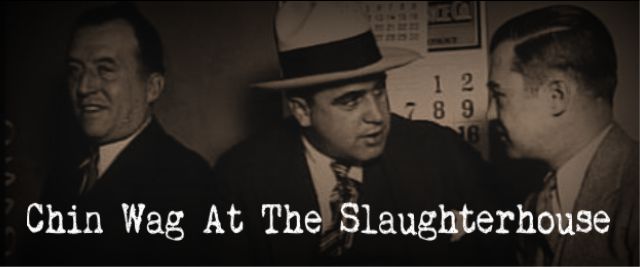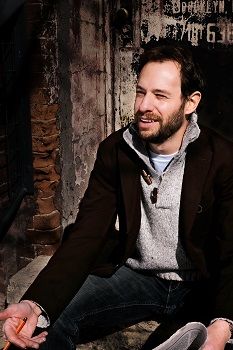
Lee Matthew Goldberg is the author of Slow Down. It is a neo-Noir thriller about the effect of speed in the modern age. His fiction has appeared in numerous magazines and he co-founded the monthly reading series called the Guerrilla Lit Reading Series. Lee met me at The Slaughterhouse where we talked about his novel and the age of surveillance.
To what extent do you think we are manipulated by media speed?
 I think we’re greatly manipulated by the alarming speed of media these days. Because of a twenty-four-seven news cycle, we’re constantly plugged into everything that is going on. Instead of solely reading the newspaper in the morning or catching a nightly news broadcast, our lives are continuously interrupted by a never-ending flow. On one hand this keeps us very informed, but it can also cause us to become desensitized. Tragedies will always be tragic, but it seems like certain ones are given the spotlight and then fade away shortly for a new horrific event to come and take its place.
I think we’re greatly manipulated by the alarming speed of media these days. Because of a twenty-four-seven news cycle, we’re constantly plugged into everything that is going on. Instead of solely reading the newspaper in the morning or catching a nightly news broadcast, our lives are continuously interrupted by a never-ending flow. On one hand this keeps us very informed, but it can also cause us to become desensitized. Tragedies will always be tragic, but it seems like certain ones are given the spotlight and then fade away shortly for a new horrific event to come and take its place.
The characters in Slow Down are affected similarly. While the world around them plays second fiddle to their own egos, they have become so consumed with a personal drive for success that they’ve lost the ability to discern between what is morally right and wrong. At the beginning of the novel, each would probably argue that they are energized by the onslaught of new media at their fingertips. By the end of the novel, the ones who survive just wish to slow everything down before they become a tragic headline too.
As Dominick the film director states towards the end, “Everything is so fast and awful, isn’t it?” To which, the main character Noah replies: “The world has become like that.”
How does your novel use narrative to counteract the manipulations of speed, for example, regarding contemporary media, or as Paul Virilio analysed it in his work Speed and Politics in reference to ‘the importance of accelerated speed, of the impact of technologies of motion, of types of mobility and their effects in the contemporary era.’
Speed and the idea of acceleration are huge parts of the narrative. Everyone in the novel is trying to cut corners to get ahead as fast as possible. ‘Fast’ becomes the designer drug they all take, which literally speeds up your heart. Noah and his brother Dex see a band called The Speeds. One character dies in a car crash from the breaks being cut. On the flip side, Dominick’s painting of a yellow circle and the yellow circle tattoos on all the actresses’ backs are overt warnings to literally ‘slow down.’ I think the rapid pace of technology these days and the ability to get whatever you want at the push of a button has caused people to become less patient. They are also unwilling to possibly change their oppressive situations because there is so much to distract them into believing they’re satisfied. The characters who survive Slow Down and flourish are the ones able to release themselves from the need for acceleration.
To what extent is identity central to the novel?
Identity is a central part of the novel. Along with a lot of camera-related imagery in the narrative, all the characters are seen in multiple senses. Noah is a spoiled uptown rich kid, but what lurks deeper are sociopathic tendencies alternating with true love for his old high school crush Nevie. Nevie is a gorgeous actress, but a drug-addicted shell of the girl Noah grew up with. Dominick is a supposed genius who directed a hit indie movie a few years back, but his wife Isadora may have be the one supplying him with all his ideas. In Dominick’s new movie called Slow Down, he wants the actors to truly experience whatever it is their characters are actually feeling. Since he’s unable to be real in his life, it’s almost as if he craves to make up for that with his film.
Inasmuch as we live in an age of surveillance do you think it is also true we live in an age of voyeurism?
In a lot of ways we do live in an age of voyeurism. From reality TV, to Facebook, to Instagram, to Twitter feeds, there is an obsession with the minutiae of other people’s lives that didn’t exist 15 years ago. Look at the Kardashians. I’ve never seen the show, but millions of dollars have been made from a glimpse into a family that really has no special talents and who was introduced to the world through a sex tape. This age of voyeurism bleeds into Slow Down as well. The characters are more comfortable viewing each other through a lens than they are face-to-face. Noah films the first time he has sex with Nevie. After she leaves in the morning without warning, he’s glad to have a documentation of their night together. It is something he can watch over and over to relive the experience, even if it never winds up happening again.
Marshall McLuhan wrote, ‘The medium is the message.’ While we document, do you think we are being documented and is it possible the records that are kept are part of social engineering?
It’s interesting because everyone has their own virtual diary these days. Through social media sites we can pinpoint exactly what we were doing five years ago today. Children are born and immediately given Facebook pages, dogs and cats are even given pages too. I just read an article about Marshall McLuhan on Pacific Standard that talked about how each generation gets some kind of a new medium, which the previous generation fears a little. 100 years ago it was radio, 60 or so years ago it was TV, and now we have teenagers who never knew what life was like before the internet and cell phones. If aliens came to Earth they would definitely think that a cell phone was a part of a human’s anatomy. But soon, a new medium is bound to come into fashion, or we might have a generation of Luddite-like kids down the line who will think it’ll be cool to live unplugged.
Who are your literary influences?
For Slow Down I was really influenced by Bret Easton Ellis and Jay McInerney. Some of my favorite novels from them have been American Psycho, Rules of Attraction and Bright Lights, Big City. Also James M. Cain, especially Double Indemnity. Overall F. Scott Fitzgerald has probably been my biggest influence. I remember reading The Great Gatsby in high school and being blown away. I’m still blown away every time I read his work.
Do you think The Great Gatsby is the classic on the great American dream? And what do you make of Mailer’s view of the American nightmare?
I agree that The Great Gatsby is one of the classic novels about the great American dream. It’s a book I re-read every few years and it always amazes me because it’s literally perfect. I love that the book clocks in at under 200 pages but feels like a giant opus every time. I think that there are elements of Gatsby in a lot of what I write. In a lot of ways Slow Down is about the darker side of the 21st Century American Dream where fame and success become paramount to everything else and lead the characters down a disastrous path.
I read Mailer’s The American Dream in grad school and it was my first introduction to him. It’s interesting since the book showcases a character that initially might have been viewed as a hero in a Hemingway novel and then chronicles his demonic breakdown. It’s also a book that can be uncomfortable to read, which is why I remember being drawn to it.
Grahame Greene wrote, ‘There is a splinter of ice in the heart of a writer.’ What do you make of his observation?
All writers do have a splinter of ice in their heads. We become emotionally attached to our characters because we create them, but we also have to be cold-blooded and realistic about what happens to them. They won’t all get fairytale endings and sometimes their outcomes will be brutal. I think it also means that sometimes you have to live in the headspace of an unsympathetic character. Noah in Slow Down has more and more sociopathetic tendencies as the novel progresses. It wasn’t always pleasant to be in his head, but it was a requirement to tell his story.
What are you working on at the moment?
I’m working on a trilogy of thrillers that center around a corporation called The Desire Card, which promises “any wish fulfilled for the right price.” I’m also working on a TV pilot that would be a dark drama. Eventually I’d like to adapt that into a novel as well. Lastly I have a literary novel that I’ve been writing forever, which has to do with hot chile peppers.
Where do you typically write?
When the weather is nice I have a tree in Central Park that I write under. I like being outside as much as possible. During the winter, I’ll either write from home, the main library on 42nd St., or I’ll rent an office space at Paragraph, which is a shared space for writers.
Thank you Lee for a great interview.
‘Slow Down,’ sold in all good book shops.
Online quick-links are Amazon US and UK, Barnes & Noble, and IndieBound.
Find Lee Matthew Goldberg at his website and on Twitter @leematthewg









One Response to Chin Wag At The Slaughterhouse: Interview With Lee Matthew Goldberg